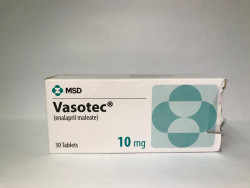Vasotec (enalapril) Coupons, Discounts & Cost
Vasotec (enalapril) is an ACE inhibitor that helps reduce blood pressure. One way to save money on the Vasotec retail cost regardless of income and insurance status is to use Vasotec coupons or discount cards from RXCoupons. Use this Enalapril coupon at this online pharmacy and receive up to 75% off the sale price.
General information about Vasotec
Vasotec (enalapril) is an ACE inhibitor that helps reduce blood pressure. Enalapril is used in both arterial hypertension and heart failure. It helps dilate the blood vessels and reduce the flow of blood to the heart.
Enalapril can be used alone or in combination with other drugs to reduce high blood pressure. It is also used to prevent renal pathology in diabetes mellitus.
Vasotec indications for use: arterial hypertension, left ventricular dysfunction, prophylaxis of coronary ischemia.
In what case you should not use Vasotec
It is not recommended to take Vasotec during pregnancy and lactation. This drug should not be used in case of hypersensitivity to enalapril, as well as if you have angioedema, cerebrovascular diseases, coronary insufficiency, aortic stenosis, hepatic or renal insufficiency, cardiac ischemia. Vasotec is not used in patients after kidney transplantation, elderly patients and patients under 18 years of age.
What side effects may occur while using Vasotec?
Blood and lymphatic system: rarely - anemia, neutropenia, agranulocytosis, pancytopenia, lymphadenopathy, autoimmune diseases.
Metabolism: rarely - hypoglycemia.
CNS: very often - dizziness; often - headache, depression; rarely - confusion, insomnia, paresthesia, vertigo, unusual dreams, sleep disturbances, blurred vision.
Cardiovascular system: often - low blood pressure, chest pain, heart rhythm disorders, angina pectoris, tachycardia; rarely - palpitation, orthostatic hypotension, myocardial infarction, Raynaud's syndrome.
Respiratory system: very often - cough; often - shortness of breath; rarely - sore throat and hoarseness, bronchospasm, bronchial asthma, rhinitis, allergic alveolitis.
Digestive system: very often - nausea; often - diarrhea, abdominal pain; rarely - intestinal obstruction, pancreatitis, vomiting, indigestion, constipation, anorexia, peptic ulcer, stomatitis, glossitis; very rarely - intestinal angioedema.
Liver and bile ducts: rarely - liver failure, hepatitis, hepatic necrosis, cholestasis (including jaundice).
Kidneys and urinary tract: rarely - acute renal failure, proteinuria, oliguria.
Skin: often - hypersensitivity reactions, edema of the face; rarely - excessive sweating, itching, hives, alopecia, Stevens-Johnson syndrome, toxic epidermal necrolysis, exfoliative dermatitis.
Other: very often - asthenia; often - hyperkalemia, fatigue; rarely - hyponatremia, hyperuricemia, hyperbilirubinemia, muscle cramps, fever.
Enalapril overdose: low blood pressure, collapse, myocardial infarction, disorders of cerebral circulation, convulsions, stupor.
How to take the drug
Enalapril should be taken orally, regardless of food intake. The initial dosage for arterial hypertension is 5 mg per day. You can increase the dose up to 10 mg if there is no effect. An increase in the dose up to 40 mg per day is permissible. You can reduce the dose to a maintenance level of 10-40 mg per day after 2-3 weeks. The recommended dosage for moderate hypertension is 10 mg per day.
Patients with hyponatremia: the recommended initial daily dose is 2.5 mg.
The initial dose for renovascular hypertension is 2.5-5 mg per day.
The initial dosage in case of chronic heart failure is 2.5 mg. Increase the dose by 2.5-5 mg every 3-4 days, but not more than 40 mg per day (once or twice daily).
The recommended dose for elderly patients is 1.25 mg. The maximum dose of Vasotec is 40 mg per day.
Vasotec warnings
Vasotec may reduce the effect of certain medicines containing theophylline.
The antihypertensive effect can be lower if you combine Vasotec with non-steroidal anti-inflammatory drugs. Do not mix this drug with diuretics, ethanol.
Care should be taken when prescribing this drug to patients with severe heart failure, coronary heart disease and cerebrovascular disease. A sharp decrease in blood pressure can lead to myocardial infarction, stroke or renal dysfunction.
Single doses should be reduced in patients with impaired renal function.
It is not recommended to drink alcoholic beverages (alcohol enhances the hypotensive effect of the drug). It is necessary to refrain from driving (dizziness is possible, especially in patients taking diuretics).

